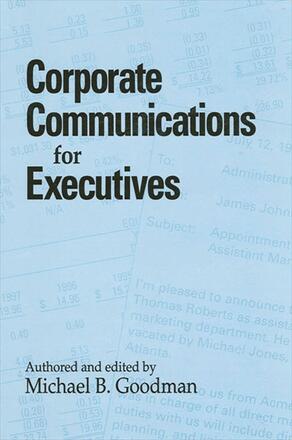
Corporate Communications for Executives
Alternative formats available from:
This strategic tool for executives to lead, motivate, persuade, and inform numerous audiences inside and outside their organizations explores corporate communication as an executive practice.
Description
Communication becomes more complex as businesses compete in a global environment. The complexity brought on by an explosion in the number of tools for communication—computers, digital media, interactive corporate television, faxes, e-mail, the Internet—fuels the need for a corporation to consider its communications as central to its strategic plans. Corporate Communications for Executives looks closely at the professional practice of corporate communication. It offers numerous perspectives on ethics, science and society, employee motivation, corporate social responsibility, internal communication, global corporate communications, and communicating corporate cultures.
Michael B. Goodman is Professor and Director of the Master of Arts Program in Corporate and Organizational Communication at Fairleigh Dickinson University. He is the editor of Corporate Communication: Theory and Practice, also published by SUNY Press, as well as the author of Working in a Global Environment: Understanding, Communicating, and Managing Transnationally; Write to the Point: Effective Communication in the Workplace; Contemporary Literary Censorship; William S. Burroughs: A Reference Guide; and William S. Burroughs.
Reviews
"The topic is of considerable significance. Clearly, corporate executives today and in the future must be aware of the globalization phenomenon. This book contains some exciting information about future trends. " — Tom McPhail, University of Missouri–St. Louis
"The underscoring of the importance of ethics in the corporation is the major significant contribution of this book. I was impressed with the author's approach to ethics from so many different angles in so many of the chapters, and I was pleased that ethics was not treated as an obligatory subject that was added as an afterthought to be 'politically correct,' the way it is treated in most textbooks on organizational communication. There are numerous books in the area of corporate communications. However, few take as broad a view of the subject as this one. " — Richard J. Dieker, Western Michigan University